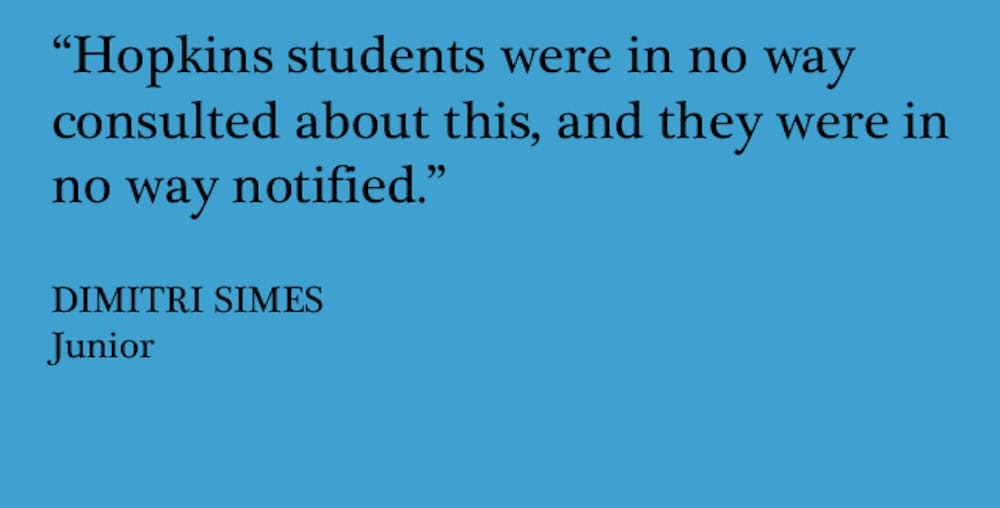The University’s decision to end the Russian major, which takes effect this academic year, has incited controversy among students and faculty. While those currently enrolled in the program will be able to complete their degrees, incoming undergraduates will no longer be able to major or minor in Russian.
Although students were previously unable to select Russian as a primary major, they had the option to add it as a second major or minor through the Goucher College-Johns Hopkins University Cooperative Program in Russian Language and Literature. Founded in 1970, the program gave Hopkins and Goucher students the opportunity to take classes at both campuses.
Program Director Olya Samilenko said that she was first made aware of the decision to end the program last November. According to Samilenko, Goucher administrators informed her that Hopkins had terminated the program due to low enrollment.
Samilenko said that she had not been consulted prior to the decision and expressed concern that she was not given an opportunity to advocate for the program.
“Had we been given a chance, we could have made a very strong argument,” Samilenko said.
Many students, such as junior Dimitri Simes, have criticized the administration for failing to communicate with those affected.
“Hopkins students were in no way consulted about this, and they were in no way notified,” he said.
According to Joel Schildbach, vice dean for undergraduate education at the Krieger School for Arts and Sciences, Goucher administrators first approached Hopkins to discuss the future of the program last summer as a result of changes in the Goucher administration.
Schildbach wrote in an email to The News-Letter that the termination of the program was a mutual decision between Goucher and Hopkins. He also explained that low enrollment influenced the University’s decision to end the major.
“The structure of the programs at Goucher and Hopkins diverged to an extent that continuing the Program in its current form became difficult,” Schildbach wrote. “The Krieger School instead decided to use its resources to expand the on-campus offerings in Russian language.”
Schildbach also explained why Hopkins leadership had decided not to inform Samilenko and Czeczulin about the program.
“Because the instructors are on the faculty at Goucher, it would be inappropriate for anyone in the Hopkins administration to be discussing the program directly with them,” he wrote.
The program is now under the direction of the Center for Language Education (CLE), a Hopkins department established in 1992. The CLE does not offer any undergraduate majors but does offer language classes to fulfill credits for other majors like International Studies and East Asian Studies.
Samilenko, a tenured professor at Goucher, and Goucher professor Annalisa Czeczulin are the only two professors who teach Russian language courses at Hopkins. Both plan to return to teaching at Goucher full time after the 2017-2018 academic year.
Although changes to the program were first discussed over a year ago, students were not officially notified about the decision until this September.
Schildbach explained why he decided not to communicate the decision with Hopkins students.
“Because... any current majors or minors will not be significantly affected by the change,” Schildbach wrote. “I... [had] not yet formally communicated anything to the students.”
Although Samilenko found out about the plans last fall, she chose not to tell Russian students at Hopkins in order to maintain a positive atmosphere.
“We didn’t want to demoralize the remaining three semesters,” she said. “We wanted to use the time productively.”
Samilenko and Czeczulin hope to explore additional possibilities for Hopkins students who want to continue Russian after the program ends.
“The two of us have spent almost an entire year trying to figure out ways in which we can accommodate our Hopkins students in new arrangements at Goucher,” Samilenko wrote in an email to The News-Letter.
According to Schildbach, the CLE plans to continue offering Russian language classes.
“The current plans are to expand the language courses so that we will regularly offer language instruction through the third year,” he wrote.
Who the instructors of those classes will be is unclear. With regards to Samilenko and Czeczulin, Schildbach said that Hopkins would “no longer have the same access [to them].”
Students like senior Ben Costello, an interdisciplinary studies major combining Russian and music theory, said that he had not been informed that the program would no longer be offered.
“The administration has been very unclear to professors and the students, not communicating with the professors what their actual status will be going forward, not communicating with the students,” he said.
Junior International Studies major Caroline Lupetini spoke about Russia’s growing importance in international politics.
“As long as these issues in Ukraine and Crimea and Europe and in our own political system keep perpetuating themselves, it’s going to be a crucial language to study,” she said.
Costello criticized the University for cutting a humanities program.
“Everyone generally is really really happy with the instructors and the quality of the instruction,” he said. “My best guess is that it’s really just the general way that Hopkins is treating the humanities right now.”
Simes believes that a strong Russian program is necessary to maintain the University’s reputation.
“Russia is a top national security priority for the United States,” he said. “I don’t really see how you can have an effective international relations education without at least having an opportunity to learn about Russia.”
He also said that students will continue to talk with administration so that students have a say in the future of the program.
“If it turns out that this decision is done in the wrong way, then of course we’re going to try and do everything we can to make our voices heard,” he said.
Despite attempts by The News-Letter, the Goucher administration could not be reached for comment.





